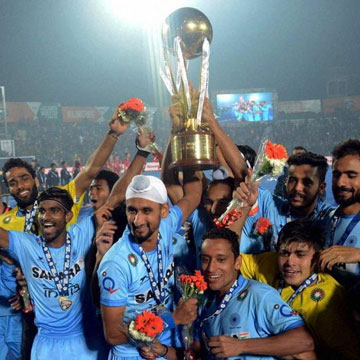 New Delhi:
New Delhi: Indian hockey in 2016 saw its process of improvements delivering results, marked by a silver medal at the FIH Champions Trophy and a perfect end to the year in the form of the Junior World Cup title after a gap of 15 years that enlightens future hopes.
The result of the Indian men's team at the Rio Games was below-par, a quarter-final entry. But India's performance was good and showcased the improvement they had shown with silver medal finishes at the Sultan Azlan Shah Tournament and the Champions Trophy before the Games.
Their only title came at the Asian Champions Trophy and the under-21 team applied the perfect finishing touch in the Junior World Cup in Lucknow.
The women's team appeared at the Olympics after a gap of 36 years and underwhelmingly finished at the 12th spot after losing four group stage games. They later in the year too tasted success, winning the Asian Champions Trophy.
Off the field, the highlight was Hockey India (HI) chief Narinder Batra being elected as the President of the International Hockey Federation (FIH) in November. He became the first Indian to head an Olympic sport federation.
However, many will latch on to the result at the Rio Games and may opine that if it was only a quarter-final appearance, then it is a failed year. But that would just be a half-hearted assessment, especially how the national team progressed under veteran Dutch head coach Roelant Oltmans.
A lot of credit goes to Hockey India League (HIL), which gives them to rub shoulders with the world's very best and in the HIL, Jaypee Punjab Warriors finally managed to bag the title.
For Punjab, Sardar Singh, S.V. Sunil and Varun Kumar sizzled and the trio played important roles in helping India earn plaudits.
India entered the final at the Sultan Azlan Shah tournament, where they lost twice to Australia, including in the final, with the identical margins of 0-4.
India's margin of losses to Australia reduced in the next tournament at the FIH Champions Tropy held in London in June. Playing without a rested captain Sardar Singh, who prior to the tournament was accused of sexual exploitation and alleged rape by a London-based woman hockey player of Indian origin, India won two out of their five matches, one ending in a draw and two losses.
In the final, it boiled down to the penalty shoot-out against Australia after both teams played goalless 60 minutes. But the team's silver medal was its best result in 38 years of Champions Trophy, also its maiden podium finish since claiming bronze in 1982.
At the Rio Games, India qualified to the quarter-finals finishing fourth in the group consisting defending champions Germany and reigning European champions Netherlands and eventual champions Argentina.
India's margin of losses to both Germany and the Ducth was 1-2 and in the quarter-final, Belgium too faced a tough fight before winning 3-1.
India's women's team couldn't win a single game at the Olympics and many blamed it on the controversial sacking of skipper and centre-half Ritu Rani.
Next task for the eves was the Asian Champions Trophy and it made amends for its earlier losses by capturing the title, prevailing over China in the final in Singapore on November 5.
The men's team too stamped its authority in the Asian meet, pipping South Korea via penalty shoot-out in the semi-final before overcoming a spirited Pakistan fightback 3-2 in the final.
Seasoned goalkeeper P.R. Sreejesh and drag-flick expert Rupinderpal Singh starred for the national team.
Afterwards, all the eyes were on the Harendra Singh-coached junior side in Lucknow. India peaked when it mattered as they moved past Australia via penalties and Belgium (2-1) in the semi-final and final respectively, bringing the Junior World Cup title home only for the second time.
The title was a perfect end to the year as it signalled a strong message for the future and the continued development process of 2016 needs to be restored, if not better, in 2017.
 New Delhi: Indian hockey in 2016 saw its process of improvements delivering results, marked by a silver medal at the FIH Champions Trophy and a perfect end to the year in the form of the Junior World Cup title after a gap of 15 years that enlightens future hopes.
New Delhi: Indian hockey in 2016 saw its process of improvements delivering results, marked by a silver medal at the FIH Champions Trophy and a perfect end to the year in the form of the Junior World Cup title after a gap of 15 years that enlightens future hopes.